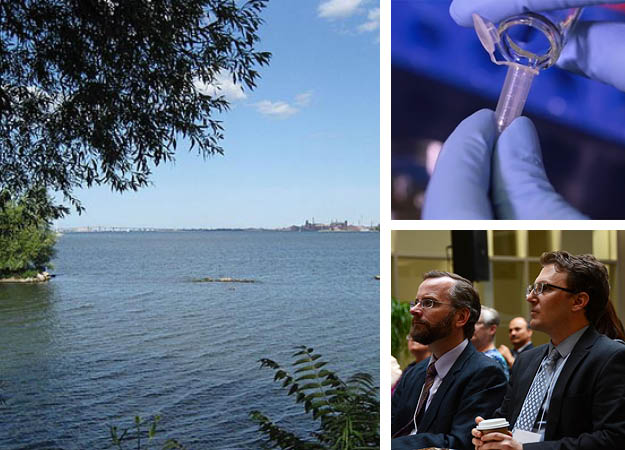McMaster ‘well-positioned’ to become a world leader in water monitoring

'The MacWater diagnostic research initiative is a cutting edge example of this interface between technological breakthrough, science discovery and decision-making to manage threats to water quality,' said Dustin Garrick (bottom right), McMaster's Philomathia Chair of Water Policy and a guest speaker at Monday's conference.
We’re surrounded by three oceans, five Great Lakes and Southern Ontario’s largest natural wetland system. When it comes to studying water, McMaster researchers have the perfect home base.
On July 7, the University’s MacWater research team will host a conference at McMaster Innovation Park, with an overall focus on challenges in water monitoring.
The interdisciplinary group of scientists and academics, led by McMaster biology professor Herb Schellhorn, believes that the key to solving some of the planet’s most pressing water-related issues involves uniting experts from a variety of disciplines.
“Developing solutions for water quality issues in Canada requires effective communication among scientists, engineers and water quality decision-makers,” said Schellhorn. “Identifying effective interactions is a goal of our meeting for the purposes of focusing effort and for identifying resources such as government grants and municipal and industrial funding to support research.
“McMaster is currently well-positioned to support research in this area because water research has been identified as a strategic area for future direction, and because of the University’s proximity to the Great Lakes, major population centres, industry and agricultural regions.”
The morning half of the event will feature presentations from a number of MacWater researchers, who will cover a wide variety of topics, including: chemical sensing in water; software infrastructure for water quality monitoring; and the use of DNA markers and signature sequences.
After lunch, a panel discussion will tackle some of the challenges in facilitating translational research in both academic and industrial settings.
Panelists for the afternoon session include: Benson Honig, professor, DeGroote School of Business and the Teresa Cascioli Chair in Entrepreneurial Leadership; Lotfi Belkhir, associate professor, Faculty of Engineering, and Class of 1962 Mechanical Engineering Endowed Chair in Eco-entrepreneurship; and Paul Grunthal, McMaster Industry Liaison Office.
Dustin Garrick, assistant professor in the Faculties of Social Sciences and Engineering and Philomathia Chair of Water Policy, will deliver a talk entitled McMaster Water Network: Connecting Science, Technology and Policy to Deliver Local and Global Impacts.
In April, Garrick helped coordinate the Philomathia Water Forum at McMaster Innovation Park, which attracted some of the country’s top scientific minds for a series of panel discussions. He’s regarded as one of the world’s leading experts on water policy, and aims to close the gap between science and policy to solve the planet’s most dire water challenges.
“The MacWater diagnostic research initiative is a cutting edge example of this interface between technological breakthrough, science discovery and decision-making to manage threats to water quality,” said Garrick.
Other invited speakers for the July 7 event include: Michelle Palmer, Ministry of the Environment; Trevor Charles, associate chair of graduate studies at the University of Waterloo; Brenda Lucas of the Southern Ontario Water Consortium; and Joanna Wilson, a McMaster biology professor.
The final portion of Tuesday’s event will feature a discussion of the most pressing water-related issues affecting China. Members of the MacWater initiative, Chang-Qing Xu and Qing Fang, recently concluded an agreement with Delin Environmental to develop a research program in McMaster Innovation Park to address these concerns.
“China has enormous water problems, including usage, pollution, jurisdictional issues and monitoring considerations,” said Schellhorn.
“The Institute of Microelectronics (Chinese Academy of Sciences) is developing new water sensor technology and, as part of a long-standing signed agreement with McMaster, has provided funding for students to attend McMaster to work with MacWater researchers.”
Members of the media are welcome to attend Monday’s event. Click here to read more about ongoing MacWater research initiatives.
